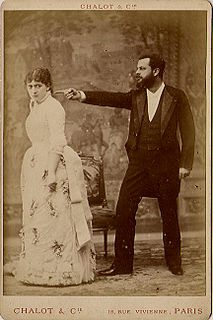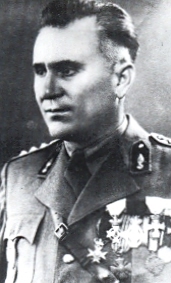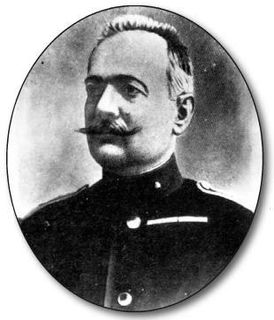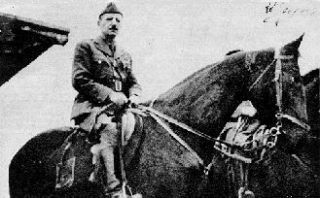 W
WChristos Adamidis was a Greek pioneer aviator and Air Force general. He was one of the first three Greek officers that received aviation training and later participated in air operations during the Balkan Wars (1912–1913).
 W
WTellos Agras was the nom de guerre of Sarantis-Tellos Agapinos, a Greek officer of the Hellenic Army who played a prominent role during the Greek Struggle for Macedonia.
 W
WMichail Anagnostakos, better known under the nome de guerre Kapetan Matapas was a Hellenic Army officer and military leader of the Macedonian Struggle.
 W
WEmmanouil Argyropoulos was a Greek pioneer aviator of the early 20th century. Apart from being the first Greek aviator who performed a flight over his homeland, he also became the first casualty of Greek military aviation.
 W
WEvripidis Bakirtzis, born in Serres, Ottoman Empire, was a Hellenic Army officer and politician. Dismissed from the army twice due to his participation in pro-republican coup attempts and sentenced to death, later during the Axis Occupation of Greece, in World War II he co-founded the EKKA resistance group and later he joined the Greek People's Liberation Army. He served as head of the Political Committee of National Liberation, a government of Greek Resistance-held territories, from 10 March to 18 April 1944. He was nicknamed "the Red Colonel", from his pen name in the communist Rizospastis.
 W
WDimitrios Botsaris was a Greek Army officer and Minister for Military Affairs.
 W
WAnastasios Dalipis, usually referred as Tasos Dalipis, was a Greek Army officer and politician, who was elected many times as a member of the Greek Parliament and served as Minister Governor-General of Western Macedonia from 1946 to 1947.
 W
WAristides Damalas, known in France by the stage name Jacques Damala, was a Greek military officer-turned-actor, who is mostly remembered as being husband to Sarah Bernhardt for a number of years. Damala's characterization by modern researchers is far from positive. His handsomeness was as notable as his insolence and Don Juan quality. Writer Fredy Germanos describes him as an opportunistic and hedonistic person, whose marriage to the great diva would inevitably intensify and maximize his vices, namely, his vanity and obsession with women, alcohol, and drugs.
 W
WKonstantinos Davakis was a Greek military officer in World War II. He organized the Greek defensive lines during the Battle of Pindus that led to Italian defeat in the first stage of the Greco-Italian War of 1940.
 W
WIoannis Dimakopoulos was an officer of the Greek Army from Arcadia. He participated as a volunteer in the Cretan Revolution of 1866 and he was killed during the holocaust of Arkadi Monastery.
 W
WDimitrios Doulis, was a Greek military officer, from Nivica in modern southern Albania.
 W
WAlberto Israel Errera was a Greek-Jewish officer and a member of the anti-Nazi resistance. He was a member of the Sonderkommando in Auschwitz-Birkenau from May to August 1944.
 W
WIoannis Frangoudis was a Greek Army officer who reached the rank of Lt General. He also competed in the 1896 Summer Olympics in Athens as a shooter.
 W
WMordechai Frizis was a Greek military officer, who fought in World War I, distinguished himself in World War II, and was killed on 5 December 1940, fighting against the Julia Division.
 W
WAngelis Gatsos (1771–1839) was a Slavophone Greek (Bulgarian) military commander during the Greek War of Independence. He was born in the village of Sarakinovo, today known as Sarakinoi.
 W
WMajor-General Thomas Gordon was a British army officer and historian. He is remembered for his role in the Greek War of Independence in the 1820s and 1830s and his History of the war published in 1833.
 W
WPavlos Iosif Gyparis was a Greek Army officer famous as the commander of the personal guard of Prime Minister Eleftherios Venizelos. He took part in many conflicts, and in 1920 was implicated in the assassination of Ion Dragoumis, a political opponent of Venizelos.
 W
WIoannis Hatzopoulos was a Greek army officer, who commanded the IV Army Corps in 1916 and was interned with his men in Görlitz, Germany.
 W
WCarl Wilhelm von Heideck was a Bavarian military officer, a philhellene and painter.
 W
WIoannis Kalogeras was a Greek army officer and politician.
 W
WEfthymios Kaoudis was a Greek revolutionary and the leader of the first Cretan armed group in Macedonia, during the Macedonian Struggle.
 W
WEvangelos Koukoudeas was a Greek chieftain of the Macedonian Struggle and hero of the Balkan Wars.
 W
WNikolaos Lytras was a Greek modernist painter who specialized in portraits, still-lifes and landscapes.
 W
WPavlos Melas was an officer of the Hellenic Army, and he was among the first who organized and participated in the Greek Struggle for Macedonia.
 W
WZachos Milios was a Greek revolutionary of the Greek War of Independence (1821–1830) and officer of the Greek army. He was the brother of the distinguished general and politician Spyros Milios.
 W
WMichael Moutoussis was one of the first military aviators in the Greek Armed Forces. During the Balkan Wars (1912–1913) he performed together with Aristeidis Moraitinis the first naval air co-operation mission in history.
 W
WNikolaos Mykonios was a fighter of the Greek War of Independence and later an officer of the Greek army.
 W
WGeorgios Papadopoulos was the head of the military coup d'état that took place in Greece on 21 April 1967, and leader of the junta that ruled the country from 1967 to 1974. He held his dictatorial power until 1973, when he was himself overthrown by his co-conspirator Dimitrios Ioannidis.
 W
WIoannis Paparrodou was an officer of the Greek Army during World War II.
 W
WDimitrios Psarros was a Greek army officer, founder and leader of the resistance group National and Social Liberation (EKKA), the third-most significant organization of the Greek Resistance movement after the National Liberation Front (EAM) and the National Republican Greek League (EDES).
 W
WStefanos Sarafis was an officer of the Hellenic Army who played an important role during the Greek Resistance.
 W
WTagmatarchis, in more archaic context transliterated as Tagmatarches, anglicized as Tagmatarch, is used in the Greek language to mean "Major". More precisely, it means "commander of a tagma" (τάγμα).
Georgios Tombras was a Greek military officer who became a guerrilla leader in the Macedonian Struggle in the early 20th century under the nom de guerre Roupakias (Ρουπακιάς).
 W
WIoannis Velissariou was a Greek Army officer and hero of the Balkan Wars. He is considered to be one of the most important figures in the military history of modern Greece. He is considered to have had a decisive role in the Battle of Bizani during the First Balkan War (1912–1913), forcing the Ottoman Army to surrender unconditionally.
 W
WKonstantinos Versis was a Greek Army officer and hero of World War II.
 W
WOlivier Voutier was a French naval officer who discovered the statue of the Venus de Milo in 1820, and fought in the Greek War of Independence.
 W
WNikolaos Zorbas, was a Greek soldier, most notable as the nominal leader of the Military League which organized the Goudi coup in 1909.